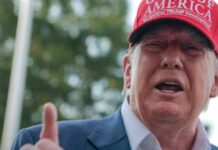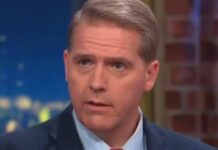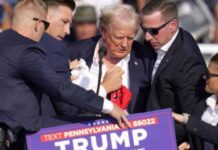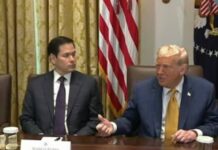
The D.C. Swamp has been corrupt for decades. It runs deeper than anyone previously thought.
And now FBI lawyer’s been implicated in crimes against President Trump in newly declassified documents.
The Corrupt Core of the FBI’s Trump-Russia Hoax Runs Deep According To Newly Declassified Documents
Washington, D.C.’s entrenched elite have long operated in shadows, shielding their misdeeds while weaponizing federal power against political outsiders. At the heart of this cesspool lies the FBI’s Crossfire Hurricane investigation—a sham probe into alleged Trump-Russia collusion that reeks of corruption and abuse. Newly declassified documents expose Kevin Clinesmith, a disgraced FBI lawyer, as a central figure in this scandal, with his actions protected by a complicit judiciary led by Judge James Boasberg. This isn’t just a story of one rogue lawyer; it’s a damning indictment of a system rotten to its core, hell-bent on undermining a duly elected president.
Clinesmith, a key player in both the FBI’s Hillary Clinton email probe and the Trump-Russia investigation, pleaded guilty in 2020 to falsifying a document critical to the FBI’s efforts to renew a FISA warrant targeting Carter Page, a Trump campaign adviser in 2016. His crime wasn’t a mere clerical error—it was a deliberate act to deceive the Foreign Intelligence Surveillance Court (FISC) into believing Page was not a CIA source, despite the agency repeatedly confirming otherwise. This lie fueled a baseless surveillance operation, yet Clinesmith walked away with a wrist-slap: a year of probation, 400 hours of community service, and no fine. The swamp protects its own.
Declassified records paint a far uglier picture of Clinesmith’s role than previously admitted. He wasn’t a peripheral figure but a linchpin in the FBI’s anti-Trump crusade. Clinesmith collaborated closely with disgraced FBI operatives Lisa Page and Peter Strzok, whose infamous text messages revealed their seething bias against Trump. He was instrumental in securing the FISA warrant against Carter Page, relying heavily on the discredited Steele dossier—a collection of unverified gossip funded by the Clinton campaign. Clinesmith’s fingerprints are all over the FBI’s efforts to target not just Page, but also Michael Flynn, George Papadopoulos, and even security expert Walid Phares, codenamed “Cross Wind,” who faced scrutiny without ever being charged.
Clinesmith’s deception extended to approving a document that justified a pretextual FBI briefing of then-candidate Trump in 2016. This wasn’t a routine intelligence update—it was a fishing expedition to gather dirt on Trump and Flynn. The FBI’s own records, drafted by agent Joseph Pientka and approved by Clinesmith and Strzok, confirm this briefing was a sham, designed to advance the Crossfire Hurricane agenda. The bureau’s willingness to exploit its authority to spy on a political campaign exposes the depths of its politicization.
Judge Boasberg, now a vocal opponent of Trump’s deportation policies, emerges as another swamp creature in this saga. As head of the FISA Court, Boasberg downplayed Clinesmith’s crimes, claiming, “Mr. Clinesmith likely believed that what he said was true,” and suggesting the falsified FISA warrant might have been approved anyway. This astonishing defense of a confessed liar undermines the integrity of the judicial system. Boasberg’s leniency—refusing the Justice Department’s request for jail time—sent a clear message: accountability is optional for the D.C. elite.
Boasberg’s rulings didn’t stop there. He appointed officials who defended the FBI’s Russiagate misconduct and renewed the bureau’s FISA powers despite its documented abuses. His recent clash with the Trump Justice Department over deportation flights further reveals his bias. When the Supreme Court ruled that Boasberg’s court lacked jurisdiction in the case, he doubled down, insisting “probable cause exists” to hold Trump officials in contempt. This is a judge more concerned with protecting the swamp’s agenda than upholding justice.
The Durham investigation, led by Special Counsel John Durham, laid bare the damage caused by Clinesmith’s actions. Durham argued that Clinesmith’s “deceptive conduct” eroded public trust in the FBI and the FISA process, tainting every application he touched. Prosecutor Anthony Scarpelli added that “the defendant’s criminal conduct tarnished the integrity of the FISA program” and caused “immeasurable” harm. Yet Boasberg brushed this aside, lamenting that Clinesmith had been “abused” and “vilified” on a “national scale.” The judge’s sympathy for a convicted liar over the public’s trust speaks volumes.
Clinesmith’s own words betray his lack of genuine remorse. While claiming, “I am deeply remorseful for any effect my actions may have had,” he maintained, “I never intended to mislead my colleagues about the status of Dr. Page.” This half-hearted apology rings hollow against the backdrop of his deliberate manipulation of a CIA email to mislead the FISA Court. His actions weren’t a mistake—they were a calculated betrayal of his oath.
The FBI’s reliance on the Steele dossier, a document riddled with “word of mouth and hearsay” and uncorroborated claims, further exposes the agency’s desperation to smear Trump. Clinesmith circulated this dossier among law enforcement, despite FBI interviews with Steele’s source, Igor Danchenko, revealing its flimsiness. Danchenko admitted much of the dossier stemmed from casual barroom chatter, with some allegations made “in jest.” The Durham report confirmed that “at no time before, during, or after Crossfire Hurricane were investigators able to corroborate a single substantive allegation in the Steele dossier reporting.”
Declassified FBI texts reveal Clinesmith’s cozy collaboration with Strzok and Lisa Page. On October 11, 2016, Clinesmith messaged Page about the “final draft of the DRAGON FISA,” the codename for Carter Page’s warrant. Their exchanges show a frantic push to rush the FISA through, with Page offering to lobby then-FBI Director James Comey’s chief of staff to expedite approval. This wasn’t law enforcement—it was a political hit job orchestrated by careerists eager to undermine a candidate they despised.
Clinesmith’s targeting of Flynn, Trump’s national security adviser, was equally egregious. He was involved in discussions about leaks of Flynn’s calls with Russian Ambassador Sergey Kislyak, which sparked a media frenzy in early 2017. FBI agent William Barnett, who worked on Flynn’s case, described the investigation as “Collusion Clue,” driven by agents out to “get Trump.” Barnett noted Clinesmith’s oversight gave the probe a veneer of legitimacy, but the goal was clear: trap Flynn into a lie or force his ouster.
The “Cross Wind” investigation into Walid Phares, a Trump ally, further illustrates the FBI’s overreach. Phares confirmed the FBI probed him over baseless allegations tied to Egypt, yet no charges were filed. “Nothing ever came of it,” Phares said, noting the investigation seemed designed to tarnish Trump’s team rather than uncover real wrongdoing. The FBI’s willingness to chase uncorroborated tips while ignoring exculpatory evidence reveals a bureau more interested in narrative than truth.
Clinesmith’s bias was no secret. In texts uncovered by DOJ Inspector General Michael Horowitz, he expressed panic after Trump’s 2016 victory, fretting that “my god damned name is all over the legal documents investigating his staff.” His infamous “Viva le resistance” message weeks later revealed a defiant commitment to opposing Trump’s presidency. This wasn’t a neutral lawyer doing his job—this was an activist abusing his authority to subvert an election.
Horowitz’s 2019 report identified 17 “significant errors and omissions” in the FBI’s FISA applications against Carter Page, with Clinesmith’s actions at the center. The report criticized the dossier’s “central and essential” role in justifying surveillance, despite its lack of credibility. Judge Rosemary Collyer, then presiding over the FISA Court, ordered a review of every FISA filing Clinesmith touched, blasting the FBI’s conduct as “antithetical to the heightened duty of candor.” Yet Clinesmith faced no real consequences, thanks to Boasberg’s protection.
The FBI’s misconduct during Crossfire Hurricane—ignoring exculpatory evidence, prioritizing political motives over facts, and leaking sensitive information—points to a systemic failure. Strzok’s handwritten notes and texts show a pattern of untruths, including false claims about the timeline of Australia’s tip about Papadopoulos. Durham’s 2023 report slammed the FBI for launching the probe without basic due diligence, noting it lacked any “significant review of its own intelligence databases” or interviews with key witnesses.
This scandal isn’t just about Clinesmith or Boasberg—it’s about a Washington establishment that thrives on unaccountability. The same insiders who pushed the Russia hoax shielded Hillary Clinton’s email scandal, leaked classified information to friendly media, and stonewalled efforts to expose their corruption. Comey’s memos, leaked to trigger Mueller’s appointment, and McCabe’s unpunished lies about media disclosures exemplify a culture where rules don’t apply to the elite.



















